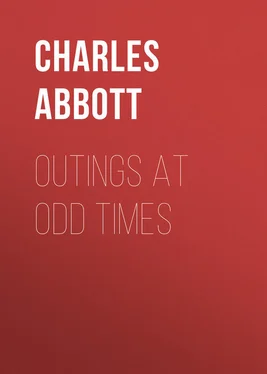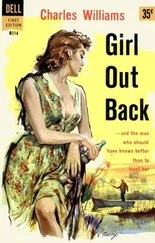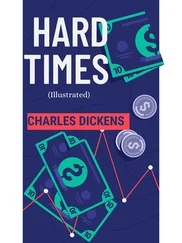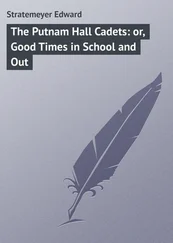Charles Abbott - Outings At Odd Times
Здесь есть возможность читать онлайн «Charles Abbott - Outings At Odd Times» — ознакомительный отрывок электронной книги совершенно бесплатно, а после прочтения отрывка купить полную версию. В некоторых случаях можно слушать аудио, скачать через торрент в формате fb2 и присутствует краткое содержание. Жанр: foreign_antique, foreign_prose, на английском языке. Описание произведения, (предисловие) а так же отзывы посетителей доступны на портале библиотеки ЛибКат.
- Название:Outings At Odd Times
- Автор:
- Жанр:
- Год:неизвестен
- ISBN:нет данных
- Рейтинг книги:5 / 5. Голосов: 1
-
Избранное:Добавить в избранное
- Отзывы:
-
Ваша оценка:
- 100
- 1
- 2
- 3
- 4
- 5
Outings At Odd Times: краткое содержание, описание и аннотация
Предлагаем к чтению аннотацию, описание, краткое содержание или предисловие (зависит от того, что написал сам автор книги «Outings At Odd Times»). Если вы не нашли необходимую информацию о книге — напишите в комментариях, мы постараемся отыскать её.
Outings At Odd Times — читать онлайн ознакомительный отрывок
Ниже представлен текст книги, разбитый по страницам. Система сохранения места последней прочитанной страницы, позволяет с удобством читать онлайн бесплатно книгу «Outings At Odd Times», без необходимости каждый раз заново искать на чём Вы остановились. Поставьте закладку, и сможете в любой момент перейти на страницу, на которой закончили чтение.
Интервал:
Закладка:
How glad, now, am I, that I caught, even in early youth, a glimpse of simpler times! In one way, however, the world has not changed; conversation continually turned upon the weather, and there was one book to which reference was often made and quite frequently consulted – the almanac. How plainly I can see my grandfather adjust his heavy-rimmed spectacles and turn to the record of the current month! “Yes, thee is right, Abijah; the moon changes in the forenoon.” Then the thin pamphlet was hung again in its place in the chimney corner. Hard-headed and alertly observant as were the farmers of fifty years ago, they all deferred to the almanac’s dictum. Men might say, perhaps, what they pleased; but if he who could write an almanac ventured to predict, who were they to dispute it? So they thought, and if snow had been foretold for the Fourth of July, they would have explained the reason why it did not come, and pity, not scorn, the prophet.
I do not know when the first almanac was hung in the chimney corner, but the custom, once started, continued to the end, and when the kitchen was dismantled, a great pile of “Poor Richards” were brought to light from a dark hole in the cavernous corner cupboard. The wisdom crowded upon those torn and tattered pages seems to have been lost, and the later generations were content, if I do not misunderstand them, with the commonplaces and predictions to which reference has been made. But with all their unquestioning reliance upon the almanac, the men who were daily out of doors were prophets unto themselves, and proud of the petty discoveries they claimed to have made. This it was that spiced their conversation and made the meeting of two or three in a cozy kitchen an attractive occurrence to young ears. I do not wonder that books were ignored, when every laboring man laid claim to peculiar knowledge, and, of course, formulated weather proverbs, the like of which have never got into print. For while the neighborhood had, like all others, its common stock of accepted “sayings,” not a man for miles around but had some two or three that he had framed for his own guidance. Every discussion teemed with “according to Joshua,” or “Jeremiah’s saying is,” but every man was largely a follower of himself. Looking backward, and studying my grandfather’s “help,” and even my farmer neighbors, I see, in the light of the present, that these men were both ignorant and wise; having a rich store of facts from which they drew illogical deductions.
Apropos of this, let me add that of a series of sixteen newspaper clippings, from papers published in October and November, 1889, fifteen of them were predictions of a winter of unusual severity in the Middle States. The one that maintained the coming of a mild winter gave no reasons for such a conclusion, but stated very briefly that “certain never-failing signs pointed that way.” It is a pity that such signs were not generally known, now that the “ground-goose, hog-bone” theory has proved unreliable.
And so it was, a year earlier. During the autumn of 1888, I gathered, by the aid of several friends, a considerable number of newspaper clippings concerning the character of the coming winter. Most of them predicted a very severe season and a late spring; a few were somewhat more moderate in the use of superlatives, and one long essay on the breast-bone of the goose made me shiver to read, although the day was warm, and in spite of the assurance that each of the “phenomenally cold periods” would be alternated by “spells of fall-like weather.” Not one hit the nail upon the head and foretold that December and January would be winter with winter left out. And only to-day (January 31) I find in a local paper that the musk-rats are stopping up the entrances to their homes, and February will be very cold. Perhaps! On the other hand, I have just received Volume I of the Geological Survey of New Jersey, in which is a most interesting chapter on the climate of this State. Looking over a tabulated statement of the weather, as characteristic of seasons, I find that we have had six notably mild winters in the past forty years, that of ’81-’82 being “one of the warmest on record.” Armed with these facts, I hunted up our oldest neighbor, Zephaniah Blank, and plied him with questions. Of course, as I intended, the conversation turned upon the weather, as it usually does, and he was very positive that we had had no such winter as the present for “nigh on to thirty years.” The old gentleman could recollect the moderately warm winter of ’57-’58, but that of ’81-’82 had passed from his mind. Had a reporter overheard our talk upon the subject, the local paper would doubtless have recorded the present as the warmest winter in thirty years, which is not the fact. Besides, we are not yet out of the woods, for February is often very cold, and March, to put the best face upon it, exceedingly tricky. Considering that weather is the most talked-of of subjects, is it not strange that upon no other is so much ignorance displayed?
It has been said that every man is a fool or a physician at forty. Whether true or not, every sexagenarian hereabouts is a weather prophet, and their combined wisdom is, as might be seen, valueless. Every one of these worthy men, as such, is a delusion and a snare, but all have faithful followers. Uncle Zephaniah, for instance, was very impatient, to express it mildly, when I spoke of the winter of 1881-’82. The curl of his lip, the glitter of his eyes and wave of his hand, when he remarked, “As if I didn’t know!” spoke volumes. Yet, in spite of his eighty years, he did not know. There is still another feature of weather wisdom, if I can call it such, that is even more remarkable – the proneness to forget the character of a season so soon after it has passed. It may be hard to believe, but many a person will stop to think when the question is put whether the great March blizzard was last year or the year before. Unless such a storm is coupled with some political event or a great disaster, as fire or shipwreck, it passes almost directly out of mind, and its magnitude dwindles in comparison to some lesser event with which the world’s history was connected. And the moral of all this is: keep a diary, swear only by it, and give nothing more than a respectful hearing to unlettered historians and weather prophets.
But if the people have changed, the country has not; and from the same woodland almanac from which they drew their facts we can draw ours. Can any one read it aright? Verily, is not Nature a tricksy author? There are the flowers that many a town dweller thinks truly report the seasons. Pshaw! Away up in Massachusetts, Bradford Torrey found over seventy plants in bloom during a November afternoon; and full well I know of a meadow where violets, bluets, dandelions, and blue-curl can be gathered, even at Christmas, and all the year round, when we have, as now (1889-’90) a typical open winter.
What of the birds? For of these and blossoms is a naturalist’s year made up. The woodland almanac goes for little so far as they are concerned – unless, indeed, you have a trained ear for varying twitters. Bird music is never lacking, and I have long held it an open question if we may not spare the thrush, when there are foxy-sparrows among the briers. So far as weather is concerned, we can not build upon our birds, and no one of our seasons lacks them. It is the whim of closet ornithologists and petty critics to assert that winter is comparatively birdless, but even this is not true. There are not so many species, but often quite as many individuals, and oftener more. Birdless, indeed! Redbirds, meadow-larks, song-sparrows, and blue jays at this moment are making merry in my garden. Notwithstanding all this, there will always be those who will strive to the end to decipher the woodland almanac, and where is he who claims not to have solved its meaning? It were well if every one spelled over a few pages of it every day. It is healthy exercise, fitting one to duties of all kinds, and never tending to sour the temper of a sane person if, at the close of threescore years and ten, he finds that he is sure of but the first lesson – there are four seasons. Weather wisdom, as we all know, meets us at every turn, and while usually irritating, occasionally proves a source of amusement. Some such experience as the following, may have been the fate of many more than I suppose.
Читать дальшеИнтервал:
Закладка:
Похожие книги на «Outings At Odd Times»
Представляем Вашему вниманию похожие книги на «Outings At Odd Times» списком для выбора. Мы отобрали схожую по названию и смыслу литературу в надежде предоставить читателям больше вариантов отыскать новые, интересные, ещё непрочитанные произведения.
Обсуждение, отзывы о книге «Outings At Odd Times» и просто собственные мнения читателей. Оставьте ваши комментарии, напишите, что Вы думаете о произведении, его смысле или главных героях. Укажите что конкретно понравилось, а что нет, и почему Вы так считаете.











